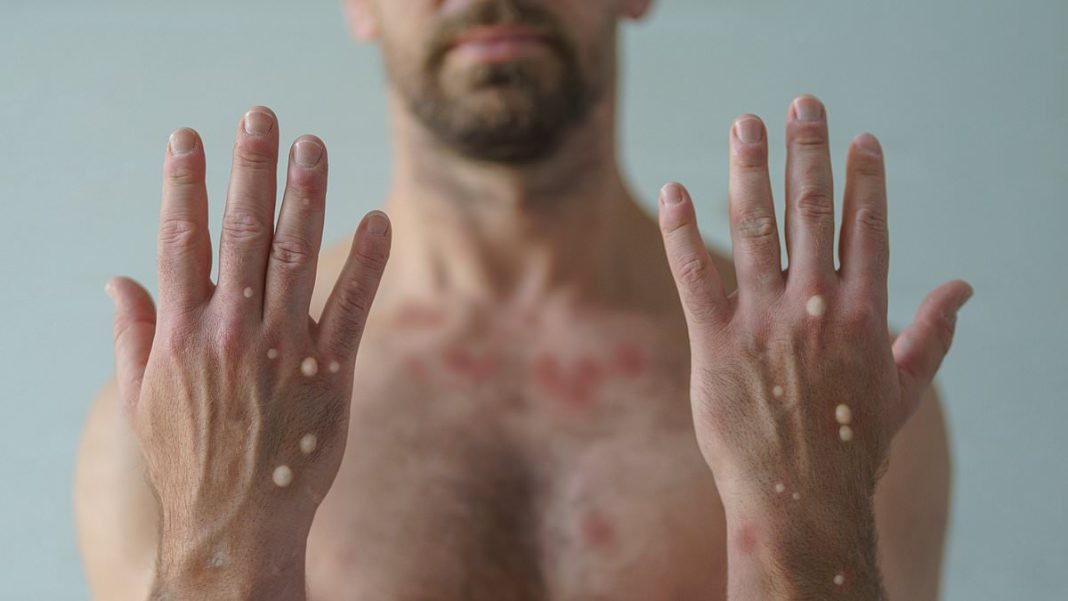Mpox strain has likely been ‘spreading undetected’ for weeks in UK,
Mpox could be silently spreading in the UK, experts fear as officials scramble to contain a potential crisis.
One Brit has already been sickened by a strain never seen in this country before, which kills one in 10 people infected.
The mutation, dubbed clade 1b, was caught after the unidentified patient travelled to the UK from a holiday in Africa on October 21, before developing symptoms a day later.
The patient has been transferred to a high-level isolation unit at the Royal Free Hospital in North London.
But top virus doctors have told MailOnline that the first patient is likely to be one of many.
‘It is very likely that there are undetected cases of mpox clade 1b in the UK,’ said Dr Azeem Majeed, a public health expert based at Imperial College London.
Meanwhile, other specialists described the unchecked spread of the virus as ‘inevitable’, adding it is ‘very likely’ multiple cases have gone undetected in the UK for weeks.
Yesterday, UK Health Security Agency (UKHSA) bosses revealed they don’t know how the person with diagnosed disease caught the the strain but investigations are ‘underway’.
They urged Brits not to panic and said the threat clade 1b poses to the public was ‘low’.
Dr Majeed said mpox can fly under the radar because symptoms can be non-specific or mild, and the skin rash could be confused with a rash from other illnesses.
‘It can even be asymptomatic,’ he added.
It is ‘essential’, he said, that ‘rigorous surveillance’ is in place to identify potential cases early and ‘curb further undetected spread of mpox’.
Meanwhile, Dr Simon Clarke, an infectious disease expert University of Reading, told MailOnline: ‘It’s definitely possible it’s spreading undetected.
‘Whenever there are asymptomatic cases, there is always the possibility of spread that we don’t know about.
‘Unless there is a systematic checking of everybody at the border — which there isn’t — then you only know about it when people come to the NHS via hospital or to their GP.
‘Inevitably, people have been traveling out of the region in Africa where it was, so it’s high likely to have spread around Europe.
‘Cases in Germany and Sweden have been picked up, so of course anybody who’s been traveling there may have also picked it up.’
Professor Paul Hunter, an infectious disease expert at the University of East Anglia, said he was ‘surprised’ that the first clade1b case in Britain hadn’t been detected sooner.
‘Just because none have been reported, it does not necessarily mean that there have been none.
‘It’s definitely plausible there’s been more infections in Europe than we’re aware about.’
However, he cautioned: ‘I don’t think it’ll be as big a problem as we saw two years ago.’
The clade 2 mpox strain spread globally in 2022 and primarily hit gay and bisexual men.
But Professor Hunter noted, the new strain could ‘pose a big problem’ if it was to start spreading among female sex workers in the UK.
Mpox is not classified a sexually transmitted infection, though it can be passed on by direct contact during sex.
Contagious lesions, through which infections are most likely to be passed on, can appear on any part of the body.
The infection can also be passed on through contact with clothing or linens used by an infected person.
Professor Hunter added: ‘Female sex workers can have multiple partners themselves, so if she had the strain, she could potentially infect quite a few men who use her services.
‘They could then spread it on to their own families.
‘If we do start seeing spread like that, then we have to change our strategy.’
The clade 1b mutation, which experts have previously called ‘the most dangerous one so far’ is believed to be behind a wave of miscarriages.
It has swept through central Africa killing at least 1,000 people, since the outbreak began.
Countries like the Democratic Republic of Congo have been hit especially hard with cases also spotted in Burundi, Rwanda, Uganda, Kenya.
However, experts say fatality rates of clade 1b from central Africa are unlikely to be replicated in developed nations like the UK due to better access to higher quality healthcare.
Britain’s first case now means it joins countries such as Sweden, Thailand, India and Germany in having cases outside of Africa.
The unnamed patient had travelled back to the UK from a holiday in Africa on an overnight flight on October 21.
They developed flu-like symptoms 24 hours later, followed by a rash, and attended A&E on October 27 where they were tested for mpox.
Fewer than 10 people are now being contact traced, although authorities are ‘still working’ on the number of people they may have to monitor, the UKHSA said.
Officials currently do not suspect the patient was infectious on the flight back from the as yet unnamed African country, they contracted the disease from.
UKHSA also said they are securing more supplies of mpox vaccines as part of further roll out of the jab.
Current mpox vaccines were used during the global 2022 outbreak against the milder strain.
Although designed for smallpox, Imvanex offers recipients cross-protection because the virus stems from the same orthopoxvirus family.
The vaccine, thought to cost £20 per dose, contains a modified vaccinia virus, which is similar to both smallpox and mpox, but does not cause disease in people.
Experts today cautioned that despite the emergence of the new strain, the Britain’s current targeted vaccine strategy ‘remains the best policy for the UK’ and all ‘at risk groups are covered’.
Dr Majeed told MailOnline: ‘The targeted vaccination programme during UK outbreak in 2022 was effective in reducing case numbers.
‘For now, I think a targeted vaccine strategy remains the best policy for the UK.
‘The targeted approach to vaccination aligns with patterns observed in previous outbreaks where most cases occurred in groups such as gay men.’
Common symptoms of mpox include a skin rash or pus-filled lesions which can last two to four weeks.
In a small number of cases, the infection can enter the blood and lungs, as well as other parts of the body like the brain which causes it to become life-threatening.
Anyone with symptoms should continue to avoid contact with other people while symptoms persist.
It can also cause fever, headaches, muscle aches, back pain, low energy and swollen lymph nodes.









